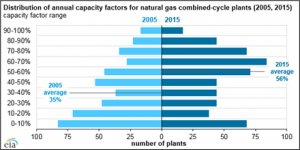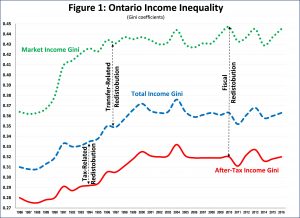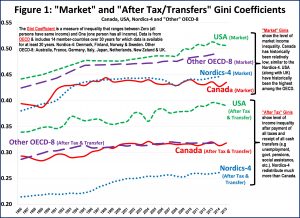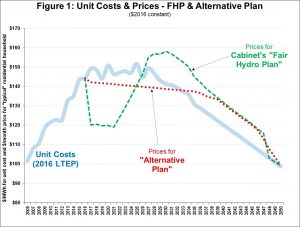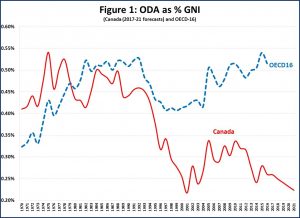After eight extensive posts about the Ontario electricity sector, I am expanding my geographic coverage to look at the electricity sectors in selected OECD countries. My focus will be on the historical and relative performance of each country’s sector with respect to decarbonization and prices. As in the case of Ontario, whole volumes could and have been written about each of these countries, and the electricity sector in general, including with respect to current and future reliability and technologies and preferred vs. feasible future decarbonization pathways and other matters. To keep this manageable, my analysis will be a high-level data-driven overview of past and current generation technology mix, sector emissions and prices only, all based on internationally-comparable data
Read More »Articles by Edgardo Sepulveda
Ontario Electricity VIII: Now also going backwards on climate
July 1, 2021There have been a number of important developments in the Ontario electricity sector since my last update when I summarized my arguments in front of the Ontario Legislature against the proposed Provincial Conservative legislation, now enacted, that eliminated the Provincial Liberal rate-based borrowing scheme to subsidize electricity prices and replace it with Government revenues. The tax-payer financed subsidy of $2.8 billion in 2018/19 has now ballooned to $6.5 billion in 2021/22 and will continue to increase. This amounts to 0.7% GDP, and is now larger than Long Term Care (LTC) public financing in the Province. Ontario is the only jurisdiction in North America where the Government directly subsidizes electricity prices – indeed, I have a standing public “challenge” for anyone to
Read More »Behind Chile’s political crisis
October 31, 2019More than one million people marched in Santiago on October 26 to protest the Government’s security response to Chile’s current political crisis and to demand structural economic reforms to reduce inequality and increase social services. In this post I analyze these grievances from a quantitative perspective and explore what it would take to translate them into policy.
This is my fourth inequality-related post. I use the same sources of data and framework of analysis as in my initial analysis focused on Canada, its update to include inequality/redistribution “models” and my analysis of inequality in Venezuela and encourage interested readers to refer to these for further conceptual and technical background.
Income Inequality
Chile has long been an economically unequal
Read More »Behind Chile’s political crisis
October 31, 2019More than one million people marched in Santiago on October 26 to protest the Government’s security response to Chile’s current political crisis and to demand structural economic reforms to reduce inequality and increase social services. In this post I analyze these grievances from a quantitative perspective and explore what it would take to translate them into policy.
This is my fourth inequality-related post. I use the same sources of data and framework of analysis as in my initial analysis focused on Canada, its update to include inequality/redistribution “models” and my analysis of inequality in Venezuela and encourage interested readers to refer to these for further conceptual and technical background.
Income Inequality
Chile has long been an economically unequal
Read More »Electrification and Climate I: Scale of the Challenge
July 2, 2019Many elements have to come together if Canada is to significantly reduce its greenhouse gas (“GHG”) emissions. There is now a technical consensus that “electrification” – the replacement of fossil fuels with electricity as an energy source – is a necessary condition for decarbonization, and that electrification will require that zero/low-emission electricity generation double or triple by 2050. In this first of a series of electricity-oriented climate-related posts, I summarize the electrification modelling evidence and analyse it in historical context.
In the doom and gloom of current climate news, electrification is a relatively good news story. From the supply side, it shows that deep decarbonization (reductions of 80% or more in GHG) is feasible at current GDP and population
Read More »Electrification and Climate I: Scale of the Challenge
July 2, 2019Many elements have to come together if Canada is to significantly reduce its greenhouse gas (“GHG”) emissions. There is now a technical consensus that “electrification” – the replacement of fossil fuels with electricity as an energy source – is a necessary condition for decarbonization, and that electrification will require that zero/low-emission electricity generation double or triple by 2050. In this first of a series of electricity-oriented climate-related posts, I summarize the electrification modelling evidence and analyse it in historical context.
In the doom and gloom of current climate news, electrification is a relatively good news story. From the supply side, it shows that deep decarbonization (reductions of 80% or more in GHG) is feasible at current GDP and population
Read More »Ontario Electricity VII – Committee Testimony
April 15, 2019The PC Government in Ontario has introduced Bill 87 which would eliminate the rate-based borrowing to subsidize electricity prices and replace it with Government borrowing.
Last week’s Provincial Budget estimates that the required borrowing to subsidize electricity prices for 2018/19 was $2.8 billion. It is likely to exceed $3 billion in 2019/20.
Ontario is the only jurisdiction in North America where the Government would directly subsidize electricity prices.
Today the Government held Committee hearings on Bill 87 and I was one of 7 individuals/groups that provided our views and were questioned by Committee members.
What follows are my prepared remarks. Readers that have followed my work on the subject will recognize all the main themes.
Opening Remarks by Edgardo
Read More »Ontario Electricity VII – Committee Testimony
April 15, 2019The PC Government in Ontario has introduced Bill 87 which would eliminate the rate-based borrowing to subsidize electricity prices and replace it with Government borrowing.
Last week’s Provincial Budget estimates that the required borrowing to subsidize electricity prices for 2018/19 was $2.8 billion. It is likely to exceed $3 billion in 2019/20.
Ontario is the only jurisdiction in North America where the Government would directly subsidize electricity prices.
Today the Government held Committee hearings on Bill 87 and I was one of 7 individuals/groups that provided our views and were questioned by Committee members.
What follows are my prepared remarks. Readers that have followed my work on the subject will recognize all the main themes.
Opening Remarks by Edgardo
Read More »Income Inequality and Redistribution in Venezuela
February 17, 2019I had been waiting for last month’s publication of the book “Confronting Inequality” before preparing my annual update on income inequality and redistribution in Canada. I am glad I did because the book presents new and exciting empirical findings that shed light on the age-old equity/growth debate (more on that below), but also introduced me to the Standardized World Income Inequality Database (SWIID). Data comparability and granularity has been a challenge for inequality researchers looking at countries outside the OECD and EU. Specifically, the lack of inequality data for market income did not allow researchers to measure and analyze the redistributive effect of Government policy. In contrast, the most recent version of SWIID provides historical estimates of Gini coefficients for
Read More »Income Inequality and Redistribution in Venezuela
February 17, 2019I had been waiting for last month’s publication of the book “Confronting Inequality” before preparing my annual update on income inequality and redistribution in Canada. I am glad I did because the book presents new and exciting empirical findings that shed light on the age-old equity/growth debate (more on that below), but also introduced me to the Standardized World Income Inequality Database (SWIID). Data comparability and granularity has been a challenge for inequality researchers looking at countries outside the OECD and EU. Specifically, the lack of inequality data for market income did not allow researchers to measure and analyze the redistributive effect of Government policy. In contrast, the most recent version of SWIID provides historical estimates of Gini coefficients for
Read More »Rent Control in Ontario
December 10, 20182018 State of the Inner City Report: Green Light Go…Improving Transportation Equity December 7, 2018Getting to doctors appointments, going to school, to work, attending social engagments, picking up groceries and even going to the beach should all affordable and accessible. Check out Ellen Smirl’s reserach on transportation equity in Winnipeg in this year’s State of the Inner City Report! Canadian Centre for Policy AlternativesInclusionary housing in a slow-growth city like Winnipeg December 3, 2018In Winnipeg, there is a need for more affordable housing, as 21 percent of households (64,065 households) are living in unaffordable housing–according to CMHC’s definition of spending more than 30 percent of income on shelter. This report examines to case studies in two American cities and
Read More »Ontario Electricity Sector VI – Meet the new boss…
August 9, 2018The provincial election of June ended 15 years of Liberal electricity policy in Ontario. Anger over high electricity prices continued to be an election issue, contributing to the Liberal loss of power and official party status (reduced from 55 to 7 seats). The PCs have formed Government with 76 seats, while the NDP is official opposition with 40 seats, and the Green Party won their first seat.
The PC Government has moved quickly to act on some of their election promises and other unannounced initiatives, including on the electricity file, convening an exceptional summer session of the Legislature. The new Minister of Energy, Greg Rickford, cancelled 756 renewable energy contracts via Ministerial Directive in early July. Later in the month the Government rushed an omnibus Act through the
Ontario Electricity Sector V – What they knew, and when they knew it…
June 6, 2018Last month I published a full-length article in the “The Monitor” magazine providing a “how we got here” analysis of the Ontario electricity sector and some options for the next Government. Since then, two things have changed: first on May 31 two investigative journalists, Carolyn Jarvis and Brian Hill, wrote an excellent story for Global News about how successive Liberal Ministers of Energy ignored expert agency advice, which resulted in Ontario households having to pay billions of dollars more for electricity (see 3:51 Global News video here); and second, on June 2 the current Liberal Premier conceded that the Liberal party will not win the election to be held tomorrow (June 7).
My article brings together and updates the four electricity-related blogs that I’ve prepared at the PEF
Ontario Election: Inequality Impacts of Fiscal Plans
May 29, 2018In the context of Ontario’s upcoming June 7 election, I just finalized an article on the CCPA’s “Behind the Numbers” blog, exploring the fiscal plans of the three major political parties from a historical and comparative context. I concluded that while the Ontario election offers voters three distinct fiscal visions, it is also true that all three would maintain Ontario’s comparatively low program expenditures and own-source revenues, at least during their first term. Building on my prior work examining the impact of fiscal policy on inequality, I develop a novel, regression-based model to forecast the impact that each fiscal plan is likely to have on income inequality in Ontario, as measured by the after-tax income Gini coefficient.
Ontario Inequality in Context
Figure 1 presents
Inequality-redistribution in Canada update
March 18, 2018Two years ago I posted my first guest blog focused on income inequality, specifically how changes in Canada’s redistribution over the last three decades have increased after-tax income inequality, and how these changes compared to OECD trends. The figures and analysis in this post update the earlier blog, based on the most recent OECD data to 2015. I also look at the market inequality-redistribution relationship and find that Canada is the only country that combines low market inequality with low redistribution.
Figure 1 presents market and after-tax income Gini coefficients for Canada and selected OECD countries. Market income is before taxes and government cash transfers, while after-tax income is after such taxes and transfers. The Gini coefficient varies from 0 to 1.00, with higher
Ontario’s Electricity Sector IV: Pre-Election Update
November 19, 2017My first, second and third posts on the Ontario electricity sector described how policy and administrative decisions by different Liberal Governments gave rise to excess electricity generation with an inflated cost structure, leading to higher electricity prices. In anticipation of June 2018 elections, the Liberal Government recently implemented a costly and first-in-Canada financial scheme to fund its “Fair Hydro Plan” (FHP) to provide a short-term 17% price reduction. Given that the FHP is now a financial reality, this post focusses on the options available to a new Government with respect to both the FHP and the main driver of Ontario’s inflated cost structure, long-term contracts with independent power producers (IPPs).
Matter #1: What to do about the FHP
Ontario consumers received
Income and geographic distribution of low-income renters in Toronto
September 20, 2017In this second of a series of housing-related posts I analyze the income and geographic distribution of renter-occupied households in the City of Toronto. My first post focussed on affordability and inequality trends by analyzing time series (2001-16) data for Ontario by household income quintiles. As a complement, this blog studies the income and geographic distribution of low-income and other renter households in Toronto based on census-tract (CT) data for 1996 and 2006. I expect to update and expand on this analysis after 2016 data is released later this year. This Toronto-specific analysis confirms the earlier provincial-level findings with respect to the broader structure and dynamics of the rental market. Based on this more disaggragate basis, I find that increased between-CT
Read More »Housing Affordability and Inequality: Low-Income Renters in Ontario
August 23, 2017I dedicate this post to the memory of Bonnie Briggs, who died earlier this month, in honour of her lifelong and tireless work on housing and homeless issues in Toronto.
In this first of a series of housing-related posts I analyze rental housing expenditures for low-income households in Ontario. Rent is the single largest expenditure element for renters in the first and second household income quintiles and is therefore an important indicator of housing affordability and expenditure inequality. This is a relatively under-studied component of the overall housing market; most policy analysis in Ontario has focussed on ownership affordability. Rent-related data is comparatively less comprehensive and detailed than ownership-related data and hence an important aspect of this first post
Ontario’s Electricity Sector III: Legislative & Finance Update
May 23, 2017My January and April posts on the Ontario electricity sector described how decisions by different Ontario governments gave rise to excess electricity generation with an inflated cost structure, leading to higher electricity prices. Here I discuss the latest development, the Liberal Government of Ontario’s proposed financial framework for its “Fair Hydro Plan” (FHP). In election mode, the Government tabled Bill 132 on May 11, introducing a mechanism to finance the FHP, creating a 17% price reduction in the short-term, but failing to acknowledge the significant price increases and massive debt that will result in the long-term. Although opposition parties have come out forcefully against Bill 132, the Liberal Government has a legislative majority and has time-allocated debate, so it will
Read More »A tale book-ended by two Trudeaus: Canada’s foreign aid since 1970
May 3, 2017Soon after the 2015 federal election, Prime Minister-designate Justin Trudeau affirmed that Canada was back as a “compassionate and constructive voice in the world” after a decade of Conservative governments. One of the most important means by which any industrialized country interacts with the developing world is via the amount, composition and effectiveness of its foreign aid, which can help boost human and economic development, mitigate humanitarian crises and reduce environmental degradation. There are many types of “foreign aid”, but the most widely-accepted and quantified is Official Development Assistance (ODA).
In this post I focus on the amount of Canada’s ODA from a historical, OECD and global (United Nations) perspective. As outlined below, based partly on former Canadian PM

